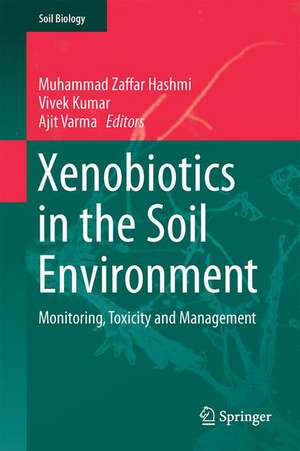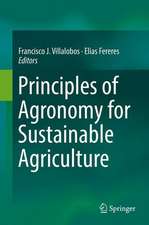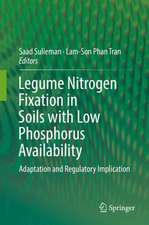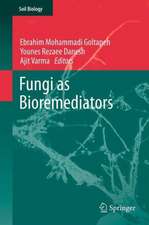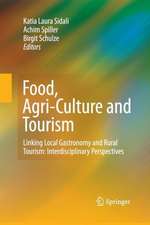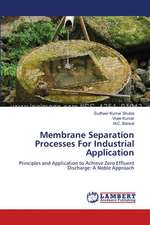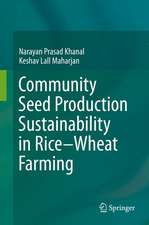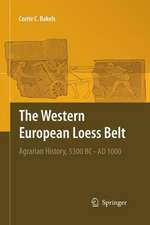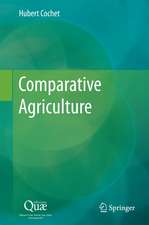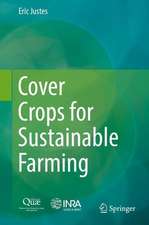Xenobiotics in the Soil Environment: Monitoring, Toxicity and Management: Soil Biology, cartea 49
Editat de Muhammad Zaffar Hashmi, Vivek Kumar, Ajit Varmaen Limba Engleză Hardback – 21 feb 2017
| Toate formatele și edițiile | Preț | Express |
|---|---|---|
| Paperback (1) | 950.33 lei 6-8 săpt. | |
| Springer International Publishing – 13 iul 2018 | 950.33 lei 6-8 săpt. | |
| Hardback (1) | 956.50 lei 6-8 săpt. | |
| Springer International Publishing – 21 feb 2017 | 956.50 lei 6-8 săpt. |
Din seria Soil Biology
- 18%
 Preț: 958.56 lei
Preț: 958.56 lei - 18%
 Preț: 1225.62 lei
Preț: 1225.62 lei - 18%
 Preț: 957.75 lei
Preț: 957.75 lei - 18%
 Preț: 1232.09 lei
Preț: 1232.09 lei - 18%
 Preț: 949.90 lei
Preț: 949.90 lei - 18%
 Preț: 1392.95 lei
Preț: 1392.95 lei - 18%
 Preț: 952.26 lei
Preț: 952.26 lei - 18%
 Preț: 1231.32 lei
Preț: 1231.32 lei - 18%
 Preț: 956.03 lei
Preț: 956.03 lei - 18%
 Preț: 948.29 lei
Preț: 948.29 lei - 18%
 Preț: 1224.18 lei
Preț: 1224.18 lei - 18%
 Preț: 1226.90 lei
Preț: 1226.90 lei - 18%
 Preț: 952.26 lei
Preț: 952.26 lei - 18%
 Preț: 942.63 lei
Preț: 942.63 lei - 18%
 Preț: 946.55 lei
Preț: 946.55 lei - 18%
 Preț: 1221.20 lei
Preț: 1221.20 lei - 18%
 Preț: 1225.94 lei
Preț: 1225.94 lei - 18%
 Preț: 946.24 lei
Preț: 946.24 lei - 24%
 Preț: 1051.27 lei
Preț: 1051.27 lei - 18%
 Preț: 1221.02 lei
Preț: 1221.02 lei - 18%
 Preț: 947.98 lei
Preț: 947.98 lei - 18%
 Preț: 948.47 lei
Preț: 948.47 lei - 18%
 Preț: 1222.31 lei
Preț: 1222.31 lei - 18%
 Preț: 1231.64 lei
Preț: 1231.64 lei - 18%
 Preț: 1225.31 lei
Preț: 1225.31 lei - 18%
 Preț: 1229.73 lei
Preț: 1229.73 lei
Preț: 956.50 lei
Preț vechi: 1166.47 lei
-18% Nou
Puncte Express: 1435
Preț estimativ în valută:
183.05€ • 190.86$ • 152.13£
183.05€ • 190.86$ • 152.13£
Carte tipărită la comandă
Livrare economică 20 martie-03 aprilie
Preluare comenzi: 021 569.72.76
Specificații
ISBN-13: 9783319477435
ISBN-10: 3319477439
Pagini: 350
Ilustrații: XVII, 400 p. 36 illus., 24 illus. in color.
Dimensiuni: 155 x 235 x 24 mm
Greutate: 0.76 kg
Ediția:1st ed. 2017
Editura: Springer International Publishing
Colecția Springer
Seria Soil Biology
Locul publicării:Cham, Switzerland
ISBN-10: 3319477439
Pagini: 350
Ilustrații: XVII, 400 p. 36 illus., 24 illus. in color.
Dimensiuni: 155 x 235 x 24 mm
Greutate: 0.76 kg
Ediția:1st ed. 2017
Editura: Springer International Publishing
Colecția Springer
Seria Soil Biology
Locul publicării:Cham, Switzerland
Cuprins
Xenobiotics, Types and Mode of Action.- Atmospheric Pollutants and its Transport Mechanisms in Soil along the Himalayas, Tibetan Plateau and Its Surroundings: A brief Note.- HCH and DDT Residues in Indian Soil: Atmospheric Input and Risk Assessment.- Antibiotics and Antibiotics Resistance Genes (ARGs) in Soil: Occurrence, Fate and Effects.- Human Being as Biomonitoring of Soil Xenobiotics.- Use of Earthworms in Biomonitoring of Soil Xenobiotics.- Emerging Metagenomic Strategies for Assessing Xenobiotic Contaminated Sites.- An Overview of Extraction, Clean up and Instrumentation Techniques for Quantification of Soil Bound Xenobiotic Compounds.- Xenobiotics in Food Chain: Quantitative Analysis, Toxic Impact and Usage History.- Biphasic Dose Response Phenomenon Induced by Xenobiotics and its Application in Soil Risk Assessment.- Agrochemicals and Soil Microbes: Interaction for Soil Health.- Soil Microbial and Enzymatic Diversity as Affected by the Presence of Xenobiotics.- Current Approaches for the Assessment of in situ Remediation of Xenobiotics.- Transgenic Approaches for Building Plant Armor and Weaponry to Combat Xenobiotic Pollutants: Current Trends and Future Prospects .- Bioavailability/Phytostabilization of Xenobiotics in Soil.- Biodegradation of Xenobiotics in Soil by Fungi.- The use of Enzymes in Bioremediation of Soil Xenobiotics .- Soil Xenobiotics and their Phyto-chemical Remediation.- Soils-PCBs-PGPRs Interactions in Changing Climate Scenarios.- Impact of Biochar on Soil Fertility and Behaviour of Xenobiotics in Soil.- Environmental Biodegradation of Xenobiotics: Role of Potential Microflora.- Biotransformation of Xenobiotic Compounds: Microbial Approach.- Environmental Bioremediation: Biodegradation of Xenobiotic Compounds.- Prominences on Xenobiotic Degradation in Ecological Sanitary.
Textul de pe ultima copertă
This book describes the vast variety of xenobiotics, such as pesticides, antibiotics, antibiotic resistance genes, agrochemicals and other pollutants, their interactions with the soil environment, and the currently available strategies and techniques for soil decontamination and bioremediation. Topics covered include: transport mechanisms of pollutants along the Himalayas; use of earthworms in biomonitoring; metagenomic strategies for assessing contaminated sites; xenobiotics in the food chain; phyto-chemical remediation; biodegradation by fungi; and the use of enzymes and potential microbes in biotransformation. Accordingly, the book offers a valuable guide for scientists in the fields of environmental ecology, soil and food sciences, agriculture, and applied microbiology.
Caracteristici
Broadens readers’ understanding of the currently available approaches for coping with polluted ecosystems All chapters contributed by researchers actively involved in the respective fields Will be of interest to scientists in the fields of environmental ecology, soil and food sciences, agriculture, and applied microbiology
